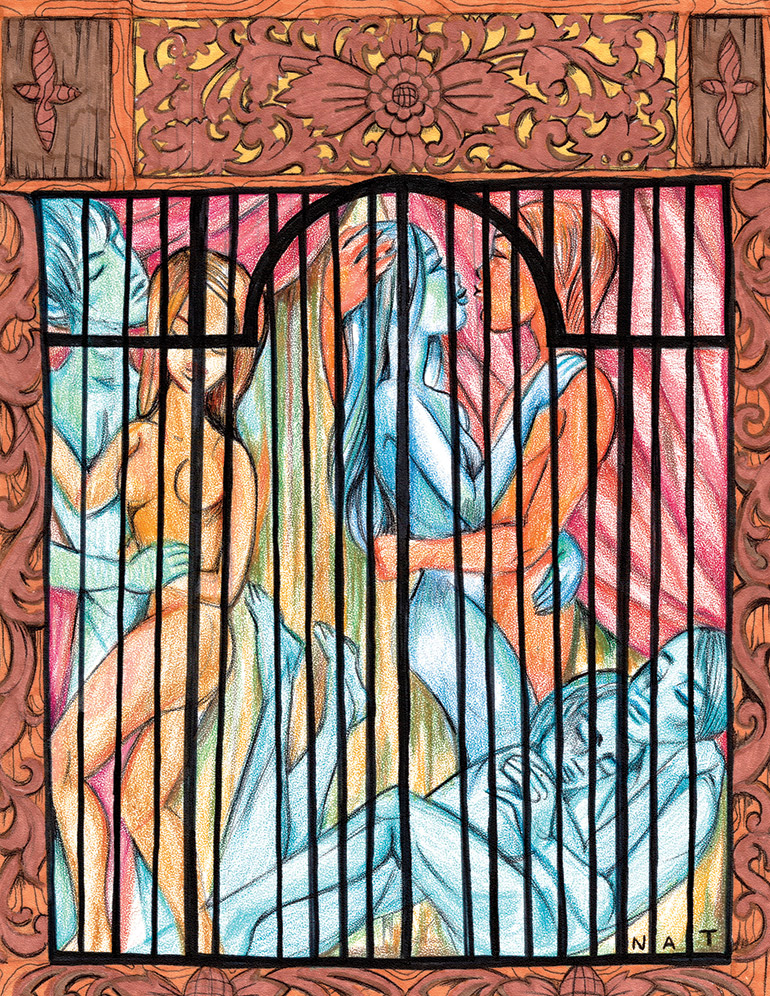Until 2014, Indonesian pilgrims seeking good fortune in the world of business would partake in an ancient tradition: sex with a stranger, at least seven times, at the tomb of Prince Samodra on Mount Kemukus. The practice arose from the Kebatinan belief system – a Javanese blend of animistic, Buddhist, Hindu and Islamic ideals – but was banned by the Central Java governor, who saw it as hazardous to health and morals.
The prohibition of this salacious, and admittedly rather extreme, sexual tradition was an early indicator of a religiously inspired fervour that would soon stretch across the archipelagic nation, where self-appointed upholders of moral standards are increasingly intervening in the private lives of Indonesian citizens.
In one of the most sweeping recent attempts to control people’s sexuality, Indonesia’s constitutional court is now considering outlawing extra-marital sex in Southeast Asia’s most populous state. An ongoing judicial review of the adultery, rape and paedophilia laws comes as the result of lobbying by conservative Islamic advocacy groups such as the Family Love Alliance. If proposed amendments are passed, all sex outside of wedlock and all same-sex relations would be criminalised. Early court hearings have already taken place, and a decision could be handed down as early as this month.
On one hand, sex is associated with morality and taboo. On the other hand, you may have sex as long as you don’t bother other people
There are more than 62 million single men and women between the ages of 15 and 45 living in the country, according to the 2012 Indonesian Demographic and Health Survey, meaning a wide swathe of the population could be affected by the change. Santi Kusumaningrum, co-director of the University of Indonesia’s Centre on Child Protection, told the Washington Post that only half of Indonesian couples are legally married, with millions having partaken in informal or ceremonial nuptials. “This law, when enforced, will immediately exclude the poor, the marginalised, people who live in remote places in the margins of public service,” she told the newspaper. And the LGBTI community, already prevented from marrying their spouses and increasingly the target of homophobic sentiments, again finds itself in the firing line of Islamic conservatives.
Yet sexuality has, as in many cultures around the world, long been a key component of Indonesian society. Activist and author Julia Suryakusuma broadly characterises Indonesians as “religious and raunchy”, saying sexuality is an intrinsic part of traditional culture, which is manifested in “our art, our dances and our temples”. Due to pre-Islamic influences of Hinduism, Buddhism and animism, sexuality has traditionally been portrayed “very purely”, she said, arguing that “notions of sexuality and spirituality are very fluid” in the ethnically diverse nation.
Irwan Hidayana, a senior researcher at the University of Indonesia’s Centre for Gender and Sexuality Studies, said there was a paradox at the heart of the nation’s contemporary sexual thinking. “On one hand, sex is associated with morality and taboo. On the other hand, you may have sex as long as you don’t bother other people,” he said.
Even the country’s national monument is imbued with sexuality. The huge phallic tower, positioned in the heart of Jakarta, is often called ‘Sukarno’s last erection’ in a playful homage to the country’s first president.
Despite the traditional prevalence of sexuality in Indonesian culture, recent decades have seen an assault on permissiveness by conservative Islamic ideologues. For Rachel Rinaldo, author of Mobilising Piety: Islam and Feminism in Indonesia, the proposed change to the adultery law represents the latest attempt by conservative Islamic groups to “impose their moral agenda” on Indonesia’s secular legal system.
During the most recent parliamentary election in 2014, the four main Islamic parties won just 31% of the vote – a paltry share given that about 87% of the population identify as Muslim. However, Greg Fealy, an expert on Indonesian politics at Australian National University, argued that it is necessary to look beyond the electoral strength of these parties to understand the political power of conservative Islam.
“Conservative Islam has now spread across the political spectrum,” Fealy said, adding that conservative Islamic positions have become “the new middle class orthodoxy”.
“The old kind of Islamic party message was that we need to have sharia law,” Fealy explained. “Today, a much more common agenda accepts the religiously neutral state but says we need more Islamically observant leaders. On particular issues they [the parties] will exercise moral leadership in the community.”
The growth of conservative Islam in Indonesia has been linked to the influence of Wahhabism, a fundamentalist branch of Sunni Islam exported from Saudi Arabia. It is manifested in legislation passed in recent years, alongside the increasingly hostile rhetoric directed at Indonesia’s LGBTI community.

An anti-pornography law introduced in 2008 defined pornography as images, sounds, film, conversations or even “body movements” containing obscenity that “violates the moral norms of society”. As well as banning hardcore pornographic videos, the draft bill prohibited various traditional costumes and dances, the exposure of female shoulders or arms, and public displays of affection. Fealy described how, following a public outcry, “politicians took fright and backed off” and “about two-thirds of the provisions were stripped out of the bill” before the passing of a watered-down version.
Ironically, a politician named Arifinto from the Prosperous Justice Party (PKS) was kicked out of the country’s House of Representatives in 2011 after several eyewitnesses testified to the parliamentary member’s inappropriate behaviour in the chamber – he had been caught looking at porn. His party had been heavily involved in the push to enact the anti-pornography law just three years earlier.
More recently, anti-LGBTI hysteria among the officialdom swept the nation at the beginning of 2016. The education minister called for a ban of LGBTI groups at universities, while a former cabinet minister tweeted that homosexuals should be “put to death” and the defence minister equated LGBTI activism to the threat of nuclear war. Some religious groups and non-governmental organisations added their voices to the clamour for the criminalisation of the LGBTI community – in February, the Indonesian Ulema Council issued a statement calling for legislation to “end LGBT campaigning activities”. That same month, the Indonesian Psychiatrists Association even classified homosexuality, bisexuality and transgenderism as mental disorders that could be cured with appropriate treatment.
Aceh province, the only part of Indonesia to enforce full sharia law, is taking its morality crusade extremely seriously. In the region, women are forbidden from wearing tight trousers, while same-sex relations and intimacy between unmarried couples are misdemeanours punishable by caning. In December last year, a woman was reportedly caned for being in close proximity to a man who was not a relative or spouse.
In line with this trend of increasingly moralistic governance, Rinaldo believes that the amendment to the adultery act will be passed. “Because the judges on the supreme court are known to be quite conservative, there is a good chance they will rule in favour of revising the law,” she said.
Whether or not state authorities will, outside of strict Islamic quarters such as Aceh, have the ability or the motivation to enforce the court’s decision is another matter. Rinaldo believes the law to be “unenforceable”, arguing that “massive criminal justice resources would be required to fully enforce a law such as this”.
In the past, other anti-permissive laws have amounted to little more than vacuous posturing aimed at capturing the conservative vote. The anti-pornography law was passed nearly a decade ago but, according to Hidayana, “our law enforcers barely use it to punish its violators”.
Fealy agreed that this apparent lack of willingness to prosecute crimes of a sexual nature was unlikely to fade away under the new proposed legislation. “The amount of adultery that takes place among the Indonesian elite is extraordinary,” he said. “There is a huge amount of hypocrisy here.”
Officials of all ranks have been accused of nefarious sexual activities in recent years. Among them was Ahmad Fathanah, a close aide of former PKS chairman, Luthfi Hasan Ishaaq, who in January 2013 was caught mid-act in a hotel room with a 19-year-old female student and a suitcase containing $103,000. An anti-corruption investigation later revealed that between 2005 and 2013 Fathanah gave expensive gifts and money to 45 different women in a sexually tainted money-laundering scheme.
But while conservative Islam is increasing its influence over Indonesian political and social affairs, the archipelago of 17,000 islands, with its population of about 250 million people, remains diverse. In 2008, several thousand protestors rallied in Hindu-dominated Bali to oppose the anti-pornography bill. Fealy recounted a “massive backlash” against the law from “all sorts of cultural groups including Papuan tribesmen and traditional Balinese dancers who dance topless”. More recently, the Straits Times reported in 2014 that more than 1,000 sex workers defiantly protested against government plans to close Surabaya’s red light district – one of the largest in Southeast Asia.
“The opposition is there too,” said Hidayana. “They are moderate and progressive Muslims, activists, academicians and civil groups, who value that diversity is the Indonesian nature and think we have to appreciate it. The conservatives are clearly using religious issues to achieve their political agenda.”


